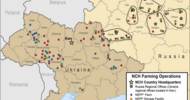Dawn | Monday, 04 May, 2009
By Afshan Subohi

The government remains divided over leasing or selling agricultural land overseas (Dawn image)
THE vast tracts of fertile Indus plains and the world’s largest irrigation network have not been sufficient enough for us to achieve food autarky because of outdated farm management practices. Now, in its bid to experiment with new ideas, the federal government has decided to play host to overseas investors keen on acquiring farmlands to capitalise on food insecurities post-2007-08 crisis.
One of the four provincial governments, however, moved in the opposite direction and blocked the farmland deals with foreign companies concluded over the last two years.
Citizens endured great pains during 2007-08 when prices of edibles increased sharply, by over 50 per cent in certain products, because of expensive food imports. The mismanagement of the rural economy and market manipulation by vested interests were blamed for the fiasco.
The political and security challenges, the current government defenders believe, did not allow the administration to fix responsibility or to proceed against the culprits responsible for the economic crisis.
Federal Minister of Investment Waqar Ahmed Khan last week announced plans to start road shows in the Gulf region from May 10 to offer one million acres (404,700 hectares) of farmland to potential investors in capital abundant food scarce region of the Middle East. Outlining his plans the minister reportedly said that during the road shows he intended to spell out the relevant government policies and regulations.
To attract investors, he said, the government would guarantee full exemption from duties and other levies for all equipment imported for foreign farmland projects. To address security concerns of the interested investors, he said that the government would install a 100,000 strong security force to ensure secured environment at farmlands.
The announcement came two days after the Balochistan government decided to scrap direct deals between UAE-based private investors and farmers in the province over the concerns regarding rights of locals. Nasir Khosa, Chief Secretary Balochistan could not be reached on phone despite several attempts.
Earlier he is reported to have told media that the deals made by foreign companies were blocked because the investment was not legal. He said attempts were made by the provincial government to let the companies explain their position but the extreme decision was taken when the companies failed to respond to governments’ inquiries. DCO Gawader Basant Khan Buledi, in whose jurisdiction the land is said to be located, was not informed about the recent developments. When contacted over telephone by this scribe, the gentleman had no clue about the direct farmland deals or their cancellation by the province.
‘I know about several housing schemes running into snags in Gawader area for want of proper documentations but I have not received any order or direction from Quetta regarding farmlands.’
A report from Dubai last week mentioned Al Qudra and Emirates Investment Group (EIG) and based on interviews of its executives, projected Pakistan as an attractive destination for farmland investment despite all odds.
A few months earlier, some locals from Mekran area contacted Dawn and expressed their frustration with Arab investors who, they said, were not honouring terms agreed at the time of the sale of private land to the companies.
According to the group in 2006 when the deal was struck the locals were promised employment on farms bought. However, instead of cultivating food crops with the involvement of locals, the investors sub-contracted land to someone else who planted fodder with the help of contract labour brought from areas outside the province. The locals were not able to provide verifiable evidence to support their statement.
Senator Hasil Bizenjo later informed Dawn that there was a lot of resentment over activities of investors in the area. ‘Poor people were lured into deals that impinge on their rights. The custodians of interests of the people of the province need to closely monitor the intrusion in the area that threaten further marginalisation of forgotten people.’
The commodity crisis of 2007-08 alerted food deficient countries. At long last the commodity producing developing countries at the losing end of the global trade reaped rich dividends as world food stocks plummeted and demand hiked to all time high. It alerted food deficient and populous countries. The Gulf countries, India, China and South Korea redrafted policies to encourage their companies to invest in farmlands abroad. They started strategising for food security. Low priced cultivable land in Africa and Asia attracted attention.
The private companies in the agribusiness saw scope for lucrative trade and joined the race to acquire land to develop farms wherever they were available at competitive prices. Suddenly, companies like Bidwells Agribusiness shot to prominence internationally for their research in related farm trade issues.
‘I am worried about losing a good idea to bad use by the government,’ said an expert with international exposure on competitive corporate promotion strategies. Not willing to own his comments he saw the policy of attracting investors for farmlands as smart but half-baked.
‘The agriculture productivity can get a major boost if efficient companies are facilitated to start business here by injecting capital and introducing modern management and technologies. Our people have displayed great potential in adapting to smart business practices if they found them workable,’ he said.
‘The government must not only be transparent it must also so appear to sell the politically sensitive ideas to the people.’
Another expert dismissed opposition and retorted that it was better to let anyone put the state land to productive use than losing it to military hierarchy in the form of multiple schemes directed to reward them for their services.
An economist feared that the motive behind the move was revenue generation to meet budgetary targets that were upset because of limited scope for privatisation in the current economic scenario. He, however, felt it to be unwise to sell the land, it should be leased following guidelines of the UN that believes hasty sell-off would compromise rights of the poor people.
Many attempts were made to get the official word on the term of reference and other details but the relevant authority responsible for land use could not be identified by bureaucratic hierarchy in Islamabad. Fauzia Wahab, a leader of the ruling Pakistan Peoples Party supported the idea and said that the situation in this regard would become clear when the road shows announced starts next week. In India foreign companies are banned from acquiring farm land but allowed to operate on rented property.
‘It is something very crucial that must be discussed in parliament before moving ahead,’ said another economist not comfortable with the idea.
By Afshan Subohi

The government remains divided over leasing or selling agricultural land overseas (Dawn image)
THE vast tracts of fertile Indus plains and the world’s largest irrigation network have not been sufficient enough for us to achieve food autarky because of outdated farm management practices. Now, in its bid to experiment with new ideas, the federal government has decided to play host to overseas investors keen on acquiring farmlands to capitalise on food insecurities post-2007-08 crisis.
One of the four provincial governments, however, moved in the opposite direction and blocked the farmland deals with foreign companies concluded over the last two years.
Citizens endured great pains during 2007-08 when prices of edibles increased sharply, by over 50 per cent in certain products, because of expensive food imports. The mismanagement of the rural economy and market manipulation by vested interests were blamed for the fiasco.
The political and security challenges, the current government defenders believe, did not allow the administration to fix responsibility or to proceed against the culprits responsible for the economic crisis.
Federal Minister of Investment Waqar Ahmed Khan last week announced plans to start road shows in the Gulf region from May 10 to offer one million acres (404,700 hectares) of farmland to potential investors in capital abundant food scarce region of the Middle East. Outlining his plans the minister reportedly said that during the road shows he intended to spell out the relevant government policies and regulations.
To attract investors, he said, the government would guarantee full exemption from duties and other levies for all equipment imported for foreign farmland projects. To address security concerns of the interested investors, he said that the government would install a 100,000 strong security force to ensure secured environment at farmlands.
The announcement came two days after the Balochistan government decided to scrap direct deals between UAE-based private investors and farmers in the province over the concerns regarding rights of locals. Nasir Khosa, Chief Secretary Balochistan could not be reached on phone despite several attempts.
Earlier he is reported to have told media that the deals made by foreign companies were blocked because the investment was not legal. He said attempts were made by the provincial government to let the companies explain their position but the extreme decision was taken when the companies failed to respond to governments’ inquiries. DCO Gawader Basant Khan Buledi, in whose jurisdiction the land is said to be located, was not informed about the recent developments. When contacted over telephone by this scribe, the gentleman had no clue about the direct farmland deals or their cancellation by the province.
‘I know about several housing schemes running into snags in Gawader area for want of proper documentations but I have not received any order or direction from Quetta regarding farmlands.’
A report from Dubai last week mentioned Al Qudra and Emirates Investment Group (EIG) and based on interviews of its executives, projected Pakistan as an attractive destination for farmland investment despite all odds.
A few months earlier, some locals from Mekran area contacted Dawn and expressed their frustration with Arab investors who, they said, were not honouring terms agreed at the time of the sale of private land to the companies.
According to the group in 2006 when the deal was struck the locals were promised employment on farms bought. However, instead of cultivating food crops with the involvement of locals, the investors sub-contracted land to someone else who planted fodder with the help of contract labour brought from areas outside the province. The locals were not able to provide verifiable evidence to support their statement.
Senator Hasil Bizenjo later informed Dawn that there was a lot of resentment over activities of investors in the area. ‘Poor people were lured into deals that impinge on their rights. The custodians of interests of the people of the province need to closely monitor the intrusion in the area that threaten further marginalisation of forgotten people.’
The commodity crisis of 2007-08 alerted food deficient countries. At long last the commodity producing developing countries at the losing end of the global trade reaped rich dividends as world food stocks plummeted and demand hiked to all time high. It alerted food deficient and populous countries. The Gulf countries, India, China and South Korea redrafted policies to encourage their companies to invest in farmlands abroad. They started strategising for food security. Low priced cultivable land in Africa and Asia attracted attention.
The private companies in the agribusiness saw scope for lucrative trade and joined the race to acquire land to develop farms wherever they were available at competitive prices. Suddenly, companies like Bidwells Agribusiness shot to prominence internationally for their research in related farm trade issues.
‘I am worried about losing a good idea to bad use by the government,’ said an expert with international exposure on competitive corporate promotion strategies. Not willing to own his comments he saw the policy of attracting investors for farmlands as smart but half-baked.
‘The agriculture productivity can get a major boost if efficient companies are facilitated to start business here by injecting capital and introducing modern management and technologies. Our people have displayed great potential in adapting to smart business practices if they found them workable,’ he said.
‘The government must not only be transparent it must also so appear to sell the politically sensitive ideas to the people.’
Another expert dismissed opposition and retorted that it was better to let anyone put the state land to productive use than losing it to military hierarchy in the form of multiple schemes directed to reward them for their services.
An economist feared that the motive behind the move was revenue generation to meet budgetary targets that were upset because of limited scope for privatisation in the current economic scenario. He, however, felt it to be unwise to sell the land, it should be leased following guidelines of the UN that believes hasty sell-off would compromise rights of the poor people.
Many attempts were made to get the official word on the term of reference and other details but the relevant authority responsible for land use could not be identified by bureaucratic hierarchy in Islamabad. Fauzia Wahab, a leader of the ruling Pakistan Peoples Party supported the idea and said that the situation in this regard would become clear when the road shows announced starts next week. In India foreign companies are banned from acquiring farm land but allowed to operate on rented property.
‘It is something very crucial that must be discussed in parliament before moving ahead,’ said another economist not comfortable with the idea.













